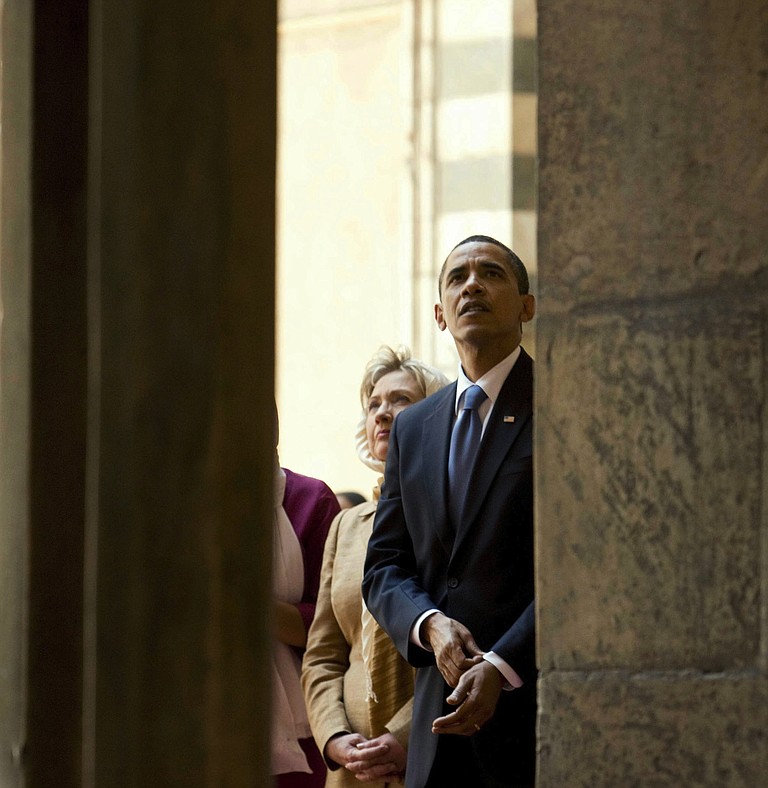Tuesday, October 16, 2012
WASHINGTON (AP) — Mitt Romney would love another debate like the last one. President Barack Obama most certainly would not.
Twenty-one days before Election Day, Debate Two comes as both candidates seek to break out of a neck-and-neck national race with the type of debate performance and vision that could help sway a narrow band of undecided voters in a handful of crucial states.
Romney needs to reinforce his case that he's an agent of change and raise further doubts about Obama's economic tenure in the face of some positive signs of recovery. Obama must reverse the corrosive story line ignited by his lame performance in the first debate and make a convincing case for four more years of his presidency.
The president has promised not to be the disengaged Obama of Debate One. Yet he won't be the caffeinated, grinning, eyes-to-the-sky Joe Biden of last Thursday's vice presidential faceoff, either. Obama's approach is more likely to resemble the methodical, persistent and affable debating style of Paul Ryan, Romney's running mate.
Still, Obama says he was too polite in the first debate. His aides promise a more aggressive president this time.
And Romney needs to sustain the apparent connection he made with many voters in his last encounter with the president, without becoming defensive in the face of Obama's more assertive stance.
It won't be easy for either.
The debate will be conducted as a town hall meeting, with the candidates fielding questions from audience members selected by the Gallup polling group for their undecided views. An aggressive approach usually doesn't work in such a format, where candidates need to connect with the questioners first before turning on their opponents.
Four years ago, Obama rival John McCain entered that election's town hall debate looking to upend a race going in Obama's direction. McCain needed to raise doubts about Obama, but his hard-hitting tone seemed off-key in the midst of earnest audience questions.
Romney has been testing the town hall format in recent campaign appearances, opening his rallies to questions from the audience. Obama has done little of that in this campaign — a stark contrast from the 2008 primaries, when the give-and-take with audiences was an essential part of his introduction to voters.
Romney aides concede that taking questions from friendly supporters is not akin to a town hall debate. Moreover, they acknowledge that the format helps Obama, who is perceived as more personable by the public, and they are aware of how he got the best of McCain four years ago.
The challenges for Obama:
This debate comes with Obama's approval ratings hovering around 50 percent. The economic and fiscal picture is mixed. Since the last debate, the government announced that the unemployment rate dropped to 7.8 percent after 43 months of being above 8 percent. Still, the Treasury Department on Friday reported that the federal deficit for the 2012 budget year that just ended was $1.1 trillion.
Romney, as he did in the first debate, will focus on the downside of the ledger — 23 million people struggling for work or better jobs, 15 percent poverty, a rising national debt. Obama will have to draw attention to the improvements under his administration, echoing the points made in a television ad released Monday that emphasizes hiring by the private sector, including more than 5 million jobs in the last 30 months.
On another front, Obama and his administration have struggled to explain the circumstances that led to an attack on the U.S. Consulate in Benghazi, Libya, that killed four Americans, including U.S. Ambassador Chris Stevens. A congressional hearing last week revealed past decisions by the State Department not to increase diplomatic security in Libya.
In his debate last week, Biden declared that "we weren't told" about the Benghazi consulate's requests for additional security, prompting Romney to accuse the vice president of "doubling down on denial" and forcing the White House to explain that Biden was referring just to the White House, not the entire Obama administration.
The challenges for Romney:
He has to live up to the high expectations he set in the first debate. His presentation then was an effective introduction to undecided or persuadable voters. Strategists from both parties said Romney particularly helped himself with Republican-leaning independent voters. He must now complete the sale with undecideds who may be leaning Obama's way.
Illustrating Romney's expectations burden, a Pew Research Center poll found that 51 percent of voters expected Obama to win the first debate compared with 29 percent who thought Romney would win. This time, a new Pew poll shows expectations for both candidates are nearly evenly divided, with 41 percent expecting Obama to prevail compared with 37 percent saying Romney will likely win.
Romney can expect to be challenged more forcefully on his economic plan than he was two weeks ago. Both Romney and Ryan have declined to specify how they would be able to cut tax rates by 20 percent across the board without raising the deficit. Obama will argue that cutting taxes for wealthier taxpayers can only result in higher taxes on the middle class, a notion Romney disputes.
Romney must also be ready to defend the more moderate political image he demonstrated in the first debate. Obama is eager to portray Romney as an out-of-the-mainstream conservative and will force Romney to explain himself on health care and changes in the government's regulatory regime, positions Romney recently softened after taking hard lines during the Republican primaries.
In the end, while the debates are attracting millions of viewers, the target audience for each campaign is becoming an increasingly small number of fence-sitting voters in a handful of battleground states.
It's a loud megaphone for a small crowd.

Comments
Use the comment form below to begin a discussion about this content.
Sign in to comment
Or login with:
OpenID